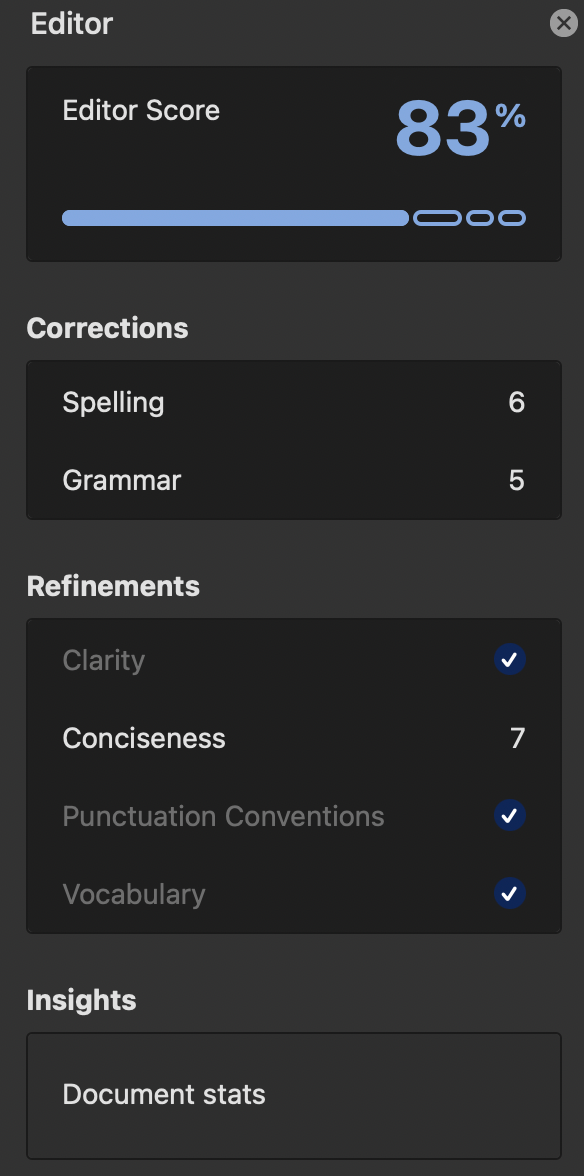Enhancing Data Literacy Through Effective Communication Strategies
Written on
Chapter 1: Understanding Readability Metrics
Recently, I stumbled upon a method for assessing writing clarity: the Flesch Reading Ease score. Although this concept dates back to the 1940s, it was a revelation for me. As someone who transitioned from data analysis to writing, I appreciate having a solid formula to evaluate how easily an article can be understood.
The formula for calculating the Flesch Reading Ease score is as follows:
RE = 206.835 - (1.015 * total words/total sentences) - (84.6 * total syllables/total words)
The scores range from 0 to 100, with 0 representing the lowest readability and 100 the highest. I discovered this scoring system while exploring the Editor section in Microsoft Word, which now displays various summary statistics about your document, including the readability score.

Chapter 2: Evaluating My Writing
Equipped with the formula, a calculator, and a strong motivation, I set out to assess the readability of my recent technical piece titled "How Do You Know Your Analysis is 'Right?'". One of my objectives on Medium is to create a data science blog that caters to beginners. However, I discovered that my article scored a readability rating of 51.9, which corresponds to an 11th-grade reading level. The ideal score for comfortable reading typically falls between 70 and 80. While my article wasn’t catastrophic, it certainly wasn’t the easiest to digest. Microsoft Word also suggested seven edits to enhance clarity—ouch!

Here’s a rough breakdown of how readability scores align with grade levels:
- 90–100: 5th-grade reading level
- 80–90: 6th-grade reading level
- 70–80: 7th-grade reading level
- 60–70: 8th and 9th-grade reading level
- 50–60: High school reading level
- 30–50: College student reading level
- 10–30: College graduate reading level
- 10 or lower: Professional or reader with an advanced degree
Even if you possess a college degree, it’s not always enjoyable to read at such a high level. For instance, "To Kill a Mockingbird" has a reading grade level of 4.7, while "The Great Gatsby" sits at 5.5. You don’t need to employ complicated language to discuss intricate subjects. Just because something can be read at an elementary level doesn’t mean it lacks depth or enjoyment.
Chapter 3: The Importance of Data Literacy
The realm of data can feel overwhelming. With rapidly evolving technologies and increasingly intricate models, many people hesitate to even grasp the basics. However, as organizations continue to produce immense amounts of data, enhancing data literacy has become crucial.

How can we clearly convey the significance, power, and best practices of data to various stakeholders? The answer lies in crafting educational content that is both clear and succinct. Everyone within an organization stands to gain from a foundational understanding of data. I aim to encourage learning rather than discourage it, even when the basics may seem daunting. From now on, I will evaluate my articles using the Flesch Reading Ease score to ensure I am continually finding simpler ways to convey technical ideas, distilling data science into its most fundamental aspects for broader audiences.
In Conclusion
Valuing data literacy requires thoughtful communication. I envision a future where no one feels intimidated by the data landscape—a future enriched by diverse perspectives in discussions about AI, machine learning, and data analytics. Ultimately, I hope people will feel empowered by data rather than frustrated, making it accessible for everyone.
p.s. This article achieved a Flesch Reading Ease score of 60.3, reflecting about a 14% improvement in readability!
Want to delve deeper into data literacy? Explore my latest article:
What Is Data Literacy?
…and why is it important?
towardsdatascience.com
Chapter 4: Video Resources for Enhanced Learning
To further support the journey towards improved data literacy, consider watching the following videos:
This video, titled "How to Improve Data Literacy and Data Skills?", provides valuable insights into enhancing your understanding and capabilities in data.
In "Why You Should Upgrade Your Data Literacy!", you’ll discover the importance of advancing your data skills and the impact it can have on your career.